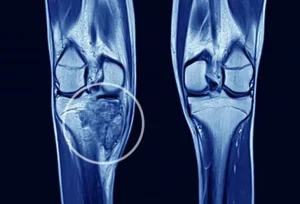Bone Cancer
Bone cancer is a rare but serious condition where malignant cells grow uncontrollably in the
bones forming tumours. It can originate in the bone tissue itself (primary bone cancer) or spread
from cancer in another part of the body (secondary or metastatic bone cancer). While bone
cancer can affect any bone, it commonly occurs in the long bones of the arms and legs, pelvis,
and spine.These tumors can weaken the bone structure, can cause fracture, pain, and interfere
with normal movement. Although it is rare, bone cancer requires specialized treatment due to its
aggressive nature. Bone Cancer can be distinguished in two types:
Primary Bone Cancer: Cancer that originates in the bone itself, such as osteosarcoma,
chondrosarcoma, and Ewing sarcoma.
Secondary Bone Cancer: Cancer that spreads to the bone from another part of the body,
commonly from the breast, lung, stomach or prostate.
At our Cancer Clinic, we combine advanced diagnostic tools, cutting-edge treatments, and
compassionate care to address not only the physical aspects of bone cancer but also the
emotional and psychological well-being of our patients.

Types of Bone Cancer
1. Osteosarcoma
Description: The most common primary bone cancer, often affecting teenagers and
young adults.
● Common Sites: Long bones of the arms and legs (commonest around the knee joints)
● Symptoms:
○ Bone pain, especially at night
○ Swelling near the affected area
○ Fractures from minor injuries
2. Ewing Sarcoma
Description: Develops in the bones or surrounding soft tissues, primarily affecting
children and young adults.
● Common Sites: Pelvis, ribs, or long bones.
● Symptoms:
○ Persistent bone pain
○ Swelling and tenderness
○ Unexplained fever
3. Chondrosarcoma
Description: A cancer originating in cartilage cells, commonly affecting middle-aged and
older adults.
● Common Sites: Pelvis, hips, and shoulders.
● Symptoms:
○ Deep, dull bone pain
○ Swelling in the affected area
○ Limited movement
4. Fibrosarcoma
Description: A rare form of bone cancer that typically affects soft tissues around the
bones.
● Common Sites: Arms, legs, or jaw.
● Symptoms:
○ Lump or mass near a bone
○ Pain that worsens over time
○ Restricted mobility
Treatments and Outlook
Our team combines advanced oncological expertise with a patient-centered approach to deliver comprehensive cancer care. We provide advanced, patient-centered cancer care, focusing on effective treatments that minimize physical and emotional impacts while preserving quality of life. Our holistic approach includes organ preservation (plastic surgery combined with complex orthopedic procedures), personalized strategies, emotional support, pain management, nutritional counseling, physical therapy, and stress management. Rehabilitation programs, such as post-surgery therapy, mobility assistance, and holistic options like yoga and meditation, empower patients to recover with strength and confidence, promoting overall healing of both body and mind. Treatment plans depend on the type, stage, and location of the sarcoma. A multidisciplinary approach is used to ensure optimal outcomes.
Targeted Therapy :
● Focuses on specific cancer cell proteins to stop growth.
● Minimizes damage to healthy tissues.
Immunotherapy:
●Boosts the immune system to identify and destroy cancer cells.
● Effective for certain subtypes.
While bone cancer cannot always be prevented, early detection plays a significant role in
improving outcomes.
